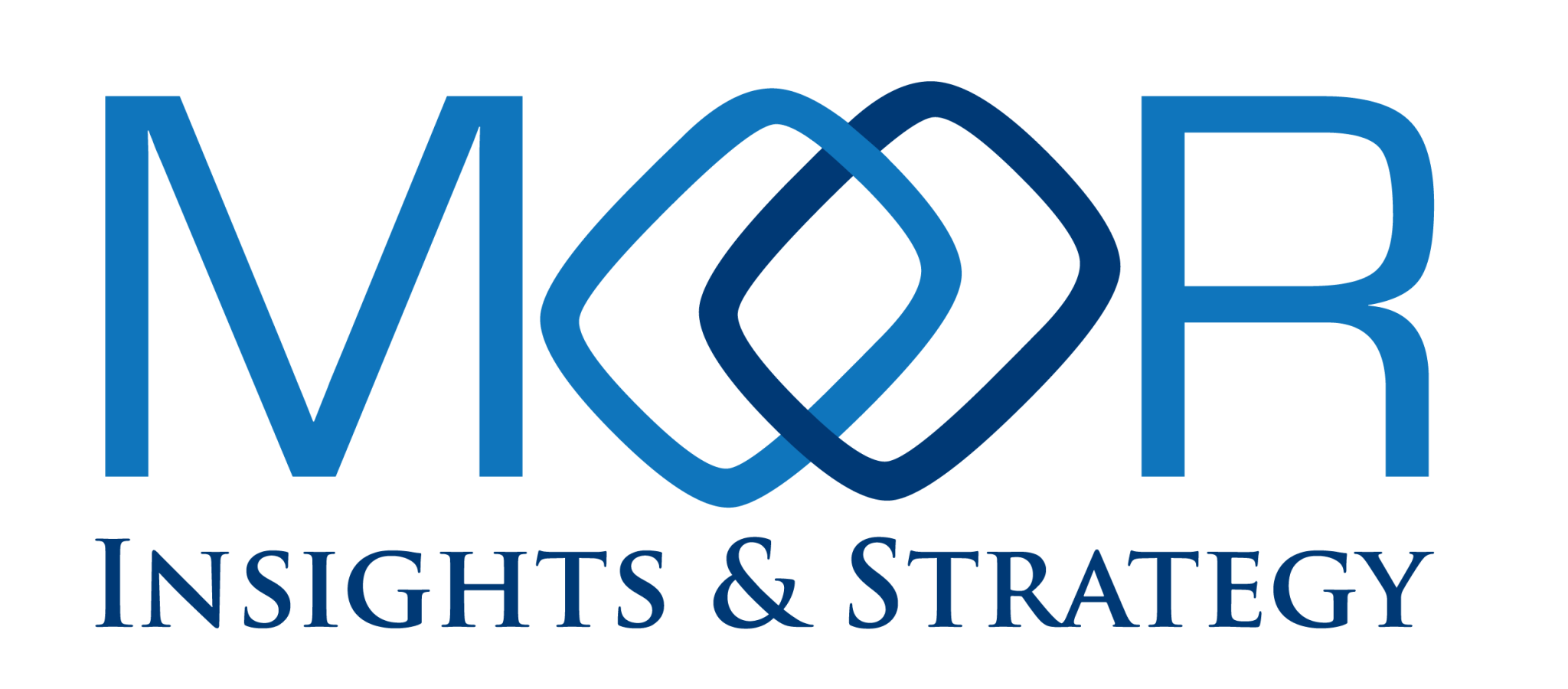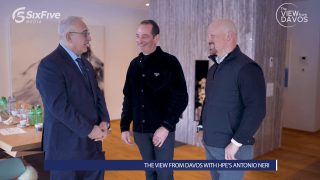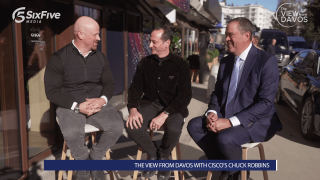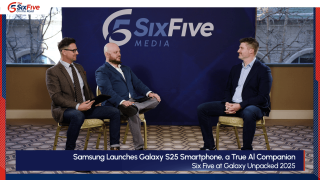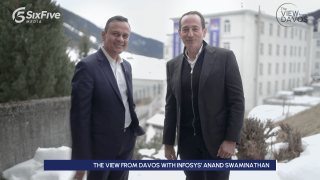Curious about what the technology industry analyst angle is at Davos?
From AI and automation to sustainability and geopolitics, Six Five Media founders, Daniel Newman, CEO at The Futurum Group, and Patrick Moorhead, Founder & CEO at Moor Insights & Strategy, are on the ground at the World Economic Forum. They are capturing the key trends and insights shaping the future of business and technology, from a slightly different perspective than what you’re used to.
Watch the latest episode of this special coverage for exclusive interviews and analysis, focusing on the “re-ordering” of priorities like sustainability, agentic AI, automation, productivity, and more.
Watch the video below, and be sure to subscribe to our YouTube channel, so you never miss our content.
Or listen to the audio here:
Disclaimer: The View from Davos is for information and entertainment purposes only. Over the course of this webcast, we may talk about companies that are publicly traded and we may even reference that fact and their equity share price, but please do not take anything that we say as a recommendation about what you should do with your investment dollars. We are not investment advisors, and we ask that you do not treat us as such.
Transcript:
Daniel Newman: Hey, everyone, welcome to Davos. Daniel Newman here. Back again and joined, by the way, first time brought my bestie with me. Patrick Moorhead, you’re here first time, first experience. What are you thinking? Take it all in.
Patrick Moorhead: Yeah. So listen, Daniel, I know I have given this event, World Economic Forum, a lot of grief prior. But I have to tell you, when it comes to the combination of meeting with senior leaders in tech, with government and finance, this is the best event for that. We’re all in one place. We are literally on one street here in Davos, Switzerland to be able to do that, and a lot of geopolitical things happening. Today a new president’s getting sworn in. I want to read the room, read the room at Davos on that, on tech, generative AI, all the above.
Daniel Newman: Yeah, it’s a big transition here, Pat. Look, the last few years it’s been all AI. Remember this show was big on sustainability. We’ve seen a fairly significant rollback on these diversity programs that really had taken the helm of a lot of technology company strategies. And you walk down the street here and right behind us, you see Microsoft. We got consulting firms like Kearney right in front of us, SAP down the road, EY. And if you go down the road, it’s like every one of these houses, it’s Qualcomm, it’s Intel, it’s Dell, it’s Workday, it’s Facebook, Meta. Got to get that right. But this really does bring the constituency of tech, and basically all the companies that are driving the implementation of this AI transformation and bringing it to the industries.
Patrick Moorhead: Yeah. Dan, you hit it spot on. And it’s not that sustainability isn’t important, it’s really a reordering of the discussion. I saw a lot of overtones even so far, that it gets back to maybe where we were seven or eight years ago, which was look at all the money we can save in power. Oh, by the way, it’s amazing for the environment. And I think we’re going to see a lot of that here, a flipping of the order. If you look at the onerous energy costs, and then if you look at the demand for energy. Whether it’s from EVs, whether it’s from hyperscaler data centers to train the next two or three generations of models, we just don’t have enough electricity. And now water comes into play to be able to cool these data centers.
Daniel Newman: Yeah. There’s a lot of very interesting stuff, and we’ve done some really interesting research. You and I, both as analysts, we sometimes wear that media hat as analysts creating media, but we’re also researchers and we do a lot of that. We spend time with a lot of CEOs. We spend time doing a lot of research. Some of the research we’ve done is like this is going to be the year, at least as I see it, of agentic. We’re hearing all about agents. Well, what are agents? Basically, the ability to take AI and create hyperscale of your business by being able to maximize and automate all these processes. Pat, we identified that we think there’s about $4 trillion of cost that can be taken out of the labor pool to drive the future of agentics. That’s one of the things I’m really interested in listening to here. The other one here is hearing how CEOs are thinking about implementing. We’ve seen these historic transformations. Remember the big data one that went on?
Patrick Moorhead: Sure.
Daniel Newman: I don’t think it was a super successful one. Then there was digital transformation, analog transformation that happened.
Patrick Moorhead: Inside joke, folks.
Daniel Newman: Inside joke. You got to watch the show if you want to get all the way inside. But the digital transformation, again, board CEOs held onto things too tight. We’re seeing it again with AI. I want to hear a little bit about how are we going to make sure AI is successful? Because you and I both know chips, infrastructure, service providers, but where’s the consumption? I mean, big deal.
Patrick Moorhead: Yeah. And this is particularly on the enterprise side, let’s break up the market into a consumer, commercial and then government. We’ve seen a lot of AI interspersed into everyday applications like X, all the properties from Meta. Apple, even though it hasn’t had a great start, is injecting that as well. But we see that mass adoption of enterprise AI is probably a couple of years away. First implementations will be through enterprise SaaS, second applications will be homegrown. And Daniel, like we’ve seen in every huge wave, there’s this insatiable appetite to change something dramatically. And whether it’s agents replacing enterprise SaaS, which probably is a five to 10-year run, because data is the biggest issue. So I’m looking for affirmation, not in the nitty-gritty here because we have leaders here, but bouncing ideas across these leaders to get feedback from them.
Daniel Newman: Yeah. A lot of prune to grow is what I call like this $4 trillion of labor taken out. Ideally, like every revolution, you see an insertion of effort that creates more productivity. So we don’t only want to see cutting, but I think what we’re seeing is that there are these monotonous, redundant roles. And originally it was always blue-collar roles.
Patrick Moorhead: Right.
Daniel Newman: Now we’re seeing it in the white-collar roles, like these knowledge roles that can be replaced or augmented by agents creating huge amounts of scale. But now we want to hear, nobody wants to hear a whole bunch of CEOs talking about cutting costs. It doesn’t make it happen. We want to hear about creating more opportunity, more productivity, more jobs.
Patrick Moorhead: Yeah, and I think that is the reality. If I look back, even desktop publishing in the ’80s was going to get rid of all the creatives. Okay? And then the iPhone was going to eliminate the need for all of these jobs.
Daniel Newman: What about more cameras?
Patrick Moorhead: No, exactly.
Daniel Newman: More cameras.
Patrick Moorhead: There we go. Hello, crew. But if you look at it, what it did is it empowered more people to do more, but the pros did more professional stuff. They did less monotonous work. They focused on even stuff that they like to do, and that’s the way that I think that this one is going to play out. We do need to have reskilling. That is a basis, as we saw in the Midwest, hence the Rust Belt. If you don’t train people for the next wave of jobs, it does have some very dire consequences.
Daniel Newman: Yeah. So there’s a lot going on here, Pat. I think you and I are going to come back, we’re going to have a number of great conversations this week. We’re talking to Yann LeCun, who’s set up with us to talk at Meta. We’re going to talk to Chuck Robbins, CEO at Cisco. We got several other panels. We’re launching our big research in partnership with Kearney here at the event. We’re sitting on panels. You and I are going to divide and conquer some stuff. If you want to see everything, you’re going to have to stay with us throughout the week, everybody. Hopefully, you’ll subscribe, you’ll be part of the Davos journey. And the newbie here will have to come back and say, “Did he fall on his sword and say it’s worth coming?” He’s at least feeling it now because you had to go back. If you look back, maybe we can actually pull up some of those tweets. This guy said some really pretty spotty, some really questionable stuff.
Patrick Moorhead: He did. Look them up.
Daniel Newman: He’s coming around.
Patrick Moorhead: I even deleted them.
Daniel Newman: He’s seeing all the tech here. He knows it’s great to be here. It’s great that you’re here with us. Thanks so much for being part of The Six Five community, Futurum, Moor insights, and hanging out with Pat and I here in Davos. We’ll see you all in a bit.
